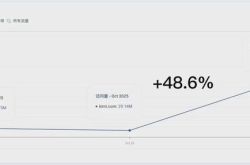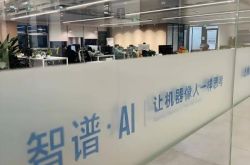Alibaba gambles big on AI, while Tencent and Xiaomi hold back
![]() 03/24 2025
03/24 2025
![]() 755
755

The giants compete in AI, Alibaba must win, and Tencent and Xiaomi are not willing to lose.
Author|Lan Dong Business Zhao Weiwei
ATM, the combination of Alibaba + Tencent + Xiaomi, represents an important technological force in the Hong Kong stock market since 2025. They are now also the three giants in the AI industry, setting the trend.
Especially in February this year, Alibaba was the first to announce an investment of over RMB 380 billion in AI infrastructure over three years, and it is expected that the investment in cloud and AI infrastructure in the next three years will surpass the sum of the past decade, a record-breaking move among domestic tech giants.
With Alibaba being so aggressive, will domestic tech peers follow suit? Now the answer is revealed in each company's annual financial reports.
Tencent is more aggressive than in the past, but it is still cautious. In the fourth quarter of last year, Tencent procured a large number of GPUs for AI services, and AI-related capital expenditure has risen to RMB 39 billion. With the help of DeepSeek, Tencent's Yuanbao APP began large-scale deployment and became the third-ranked AI-native mobile application in China in terms of DAU. This year, Tencent expects capital expenditure to account for a low double-digit percentage of revenue, which, if calculated at 13%-15%, means Tencent's capital expenditure will be in the scale of RMB 100 billion this year.
For Xiaomi, which achieved record-high revenue and profit, its AI investment this year is not insignificant either. Xiaomi's R&D expenses this year are expected to be RMB 30 billion, with AI-related investment accounting for about a quarter, or RMB 7-8 billion. "Of course, this is from a financial perspective. If you look at it from a cash flow perspective, the actual investment will exceed this number," said Xiaomi President Lu Weibing at the earnings call.
Betting on AI, ATM has put up the highest stakes in their respective histories, and they all want to find their tickets to the future. For ordinary people, in the lives of social media, e-commerce, and smart devices such as mobile phones in 2025, they will definitely experience more and more AI intelligence. Can they become a part of helping our lives?
Tencent, disclosing the AI path for the first time
On the day Tencent released its 2024 annual financial report, it held the Digital Ecosystem Conference City Summit in Shanghai. Among the preheating information for this summit, the most attractive one was that Tencent displayed its AI development path to the public for the first time.
This Tencent AI Summit can be said to be mainly prepared for B-end industries such as government, finance, and education, with the keyword being "boosting industrial efficiency and innovation."
Tang Daosheng, CEO of Tencent Cloud and Smart Industries Group, mentioned several cases, including the use of a large model knowledge engine by leading logistics group DHL, which orchestrated 41 enterprise-specific workflows and used AI to automatically receive customers; in the Thai market, CP AXTRA, a retail company under the Charoen Pokphand Group, successfully migrated its main retail and wholesale business systems to Tencent Cloud; and in the overseas expansion of GAC Aion, Tencent Cloud also helped deploy digital infrastructure, which was completed in three months.
However, for C-end users, Tencent's AI perception has been stronger in the past period. Whether it's WeChat Search or Tencent Yuanbao, they have widely and deeply integrated into users' lives with the help of DeepSeek. Yuanbao APP once caught up with ByteDance's Doubao in downloads. Tang Daosheng defined the keyword for C-end AI use as "boosting a better life for the public," bringing useful and easy-to-use intelligent experiences to users.
Providing growth for B-end enterprises and popularizing C-end demand can be said to be the key to Tencent's current AI development path.
"Advancing the full link of self-developed Hunyuan large models" + "embracing open-source large models such as DeepSeek" have constituted Tencent's basic ideas for large model development. Giving customers the freedom to choose to meet different cost-performance requirements has become a feature of Tencent's large models.
In addition to the support of DeepSeek, the three unique advantages of Tencent Yuanbao demonstrated by Tang Daosheng are: exclusive access to high-quality content sources from WeChat official accounts, support for one-click import of WeChat files, and support for uploading Tencent documents and one-click export of conversations. It is this clear advantage that has enabled Tencent to start mass deployment of the Yuanbao APP, and the daily active users of Tencent Yuanbao have increased by 20 times in the past month.
Now that the AI development path is clear, Tencent's AI development route with Yuanbao as the pioneer may evolve into a powerful native AI assistant in the future. Tencent President Martin Lau believes at the earnings call that Yuanbao will not be Tencent's only AI entry point, and AI functions will be integrated into products such as WeChat, QQ, and QQ Browser, and the synergy between different products will expand the user base.
More importantly, Tencent has already obtained a certain return from its AI investment, and it is becoming more apparent.
Last quarter, Tencent revealed that the proportion of AI-related revenue was around 10%, which is not high compared to American cloud vendors. However, this quarter, Tencent's advertising revenue increased by 20% year-on-year to RMB 121.4 billion, mainly driven by the growth of advertising on video numbers, mini-programs, and WeChat Search, with a growth rate far exceeding the industry average, and AI played an indispensable role in driving this growth.
Monetizing through advertising rather than a subscription model is a difference between Chinese tech giants and European and American tech giants in their AI development paths. The path demonstrated by Tencent is that faster and higher-quality AI searches naturally lead to higher advertising monetization, and the lifecycle of games is also extended.
This is also one of the reasons why Tencent's capital expenditure on AI will reach RMB 100 billion this year. Over the past year, Tencent's R&D investment related to AI was RMB 70.7 billion, and its capital expenditure exceeded RMB 76.7 billion, a record high, accounting for 11.6% of total revenue. This year, Tencent's capital expenditure on "powering AI" will continue to advance at this level.
Xiaomi, investing over RMB 7.5 billion in AI
For Xiaomi, during the 2024 earnings call, more attention was paid to its booming automotive business, followed by AI.
However, AI is a battle that Xiaomi cannot afford to lose. In Xiaomi's products such as automobiles, smartphones, and smart appliances, the implementation of AI is achieved through deep integration with Xiaomi's Pengpai OS 2, aiming to empower the strategy of "people-car-home full ecology" and enhance users' intelligent experience. Within Xiaomi Group, AI is also improving efficiency in scenarios such as production, sales, and customer service.
In terms of capital expenditure, Xiaomi's expenditure over the past year was RMB 10.5 billion, of which RMB 6.4 billion was for mobile phones and AIoT, and RMB 4.1 billion was for automobiles. The increment in this part of the expenditure compared to 2023 is related to the automobile and AI businesses. The capital expenditure for 2025 will continue to grow, and the increment is also for the automobile and AI businesses, but Xiaomi did not disclose specific figures during the earnings call.
In terms of R&D expenses, Xiaomi's R&D expenses this year are RMB 30 billion, an increase of RMB 5.9 billion from 2024, maintaining a stable growth rate. The data mentioned by Xiaomi President Lu Weibing at the earnings call is that among the overall R&D expenses of RMB 30 billion, AI investment will account for about a quarter. In other words, Xiaomi's R&D expenses for AI investment are roughly in the scale of RMB 7-8 billion.
"If you look at it from a cash flow perspective, the actual investment will exceed this number," Lu Weibing believes that Xiaomi's investment in AI is significant, and the three core technologies in Xiaomi's ecosystem are AI, OS, and chips.
Lu Weibing is quite satisfied with Xiaomi's AI layout, especially the "Super Xiaoai" AI assistant released at the end of last year. He mentioned the user reputation of "Super Xiaoai" twice during the earnings call. Users use it frequently, and it has solved many pain points that could not be answered continuously before. It will also play an important role in the intelligent cockpit of cars in the future.
However, compared to other domestic mobile phone manufacturers, Xiaomi's AI capabilities are not outstanding and are still in the stage of building infrastructure and consolidating technology.
Especially on the mobile phone side, even Apple is currently facing an awkward situation. The highly anticipated new Siri features in Apple Intelligence have been indefinitely postponed, and the AI leader has been replaced. Regarding Xiaomi's AI OS capabilities on mobile phones, Lu Weibing admitted that there is still a certain distance from a true AI OS, which may take 2-3 years. AI functions are used on mobile phones, but user stickiness has not met expectations.
Compared to Xiaomi mobile phones, the AI experience on Xiaomi automobiles may be realized earlier, after all, intelligent driving is the most cutting-edge and near-monetizable AI technology.
According to Lei Jun's plan, Xiaomi Automobiles will launch full-scene intelligent driving functions in 2025, covering highways, urban roads, and parking scenarios, striving to enter the L3 stage. Xiaomi will also invest over RMB 6 billion in the field of intelligent driving within three years. The latest progress is that in February, Xiaomi Automobiles have started full-scale deployment of end-to-end full-scene intelligent driving functions, and the competition at the L3 level among automakers has already begun on the path from quantity to quality.
Alibaba, AI is a battle it cannot lose
One month after proposing the AI investment target of RMB 380 billion, Alibaba CEO Wu Yongming advocated for the comprehensive realization of "AIization" across Alibaba's existing businesses.
Specifically, this year, the performance of all Alibaba's business departments will be evaluated based on how they use AI to promote growth. Core e-commerce departments such as Taobao and Tmall are cooperating with Tongyi Qianwen engineers from Alibaba Cloud to jointly develop functions that improve efficiency and user experience. There are even insiders revealing that a series of AI-native applications will be launched this year, and they believe that a killer AI application more popular than Douyin will soon emerge.
On the same day that Alibaba proposed strong assessment and cooperation in AI, ByteDance also began changes in its AI strategy, emphasizing internal delegation of authority and collaboration.
Seed is ByteDance's large model department, previously led by Zhu Wenjia. After Wu Yonghui, the former vice president of Google DeepMind, joined ByteDance in February this year, he began to lead the Seed Edge team responsible for basic research on large models, with Zhu Wenjia and Wu Yonghui being at the same level.
At the Seed internal all-hands meeting, the Seed Edge team began to become more important, proposing to suspend quarterly OKR and semi-annual performance evaluations for the Seed Edge team, provide sufficient computing power, expand internal information sharing permissions, enhance cross-team collaboration, and a series of other measures.
The core behind this change is still the revelation brought to ByteDance by the popularity of DeepSeek: to conduct more forward-looking and basic AGI frontier research than pre-training and large model iteration, aiming at the next-generation paradigm of AI, rather than the DAU of a product.
Among domestic tech giants, the only one that can compete with Alibaba in AI investment is ByteDance.
Previously, foreign media reported that ByteDance invested over USD 20 billion (equivalent to RMB 150 billion) in AI infrastructure construction in 2025, including RMB 40 billion prepared for purchasing AI chips in 2025, which is twice the expenditure in 2024, and plans to invest about USD 6.8 billion overseas. ByteDance subsequently denied this report.
Just as ByteDance turned Doubao APP into a national-level AI application, Quark has also been active recently and has become a star product of Alibaba in AI applications.
The new definition of Quark is the "AI Super Box," which integrates AI dialogue, deep thinking, deep search, deep research, and deep execution into one, satisfying all user needs with an extremely simple "AI Super Box." Moreover, the latest achievements of Alibaba's Tongyi Qianwen model will first be accessed to Quark in the future. Wu Jia, president of Alibaba's Intelligent Information Business Group, has also become the CEO of Quark, a move also seen as an elevation of the strategic position of this business.
Quark is the most obvious frontline product in Alibaba's AI offensive, and a series of layouts behind it, such as capital investment, talent competition, and paradigm innovation, will gradually unfold in the rivalry between Alibaba and ByteDance, which will become the most important competitive landscape in China's AI industry in 2025.
This battle is one that Alibaba cannot afford to lose, after all, Joe Tsai said, "If we cannot keep up with the continuous and amazing progress brought by AI every day, we will be replaced."







